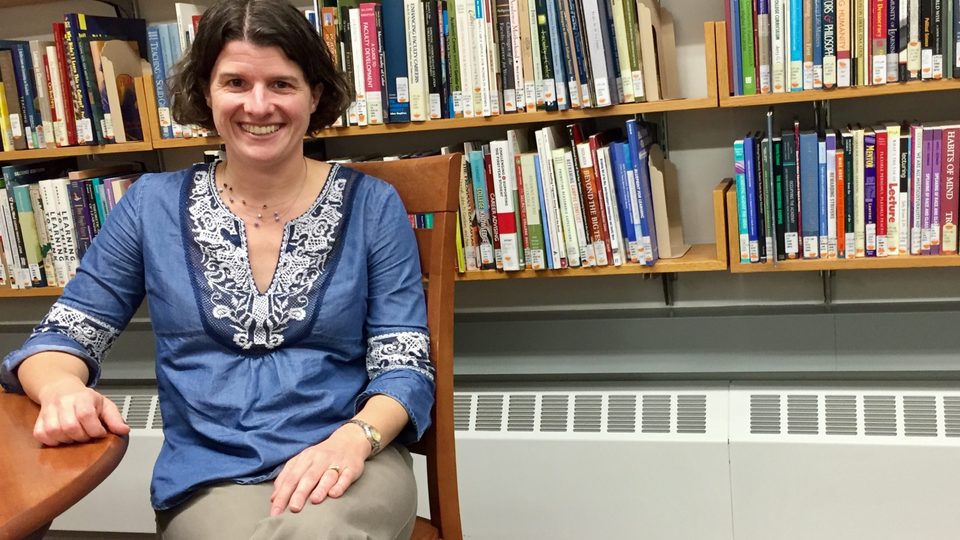Profiles in Teaching: Eblen-Zayas expands experimental reach at LTC
Being the face of the Perlman Center for Learning and Teaching has allowed Melissa Eblen-Zayas to think about campus engagement with newfound intentionality.

An experimental physicist by training, Melissa Eblen-Zayas has learned to trust trial and error in the Carleton classroom.
Nothing has to be set in stone. Follow where the process can take you. Results don’t always have to be perfect.
“That tends to be my view of everything I do,” says Eblen-Zayas, an associate professor of physics. “Let’s just try it as an experiment.”
Halfway into her tenure as director of the Perlman Center for Learning and Teaching (LTC), Eblen-Zayas is relying on those same exploratory impulses to help fellow professors examine the future of teaching at Carleton. Eblen-Zayas succeeded art professor Fred Hagstrom as LTC director last year. The first half of her three-year term has largely been about maintaining the LTC’s successful platforms for collegial conversation—theme lunches, workshops, book groups, mentoring programs, and new faculty orientation, among them. Yet while she hasn’t completely given up classroom life—Eblen-Zayas still teaches two physics courses a year—being the face of the LTC has allowed her to think about campus-wide engagement with newfound intentionality.
“Certainly over 13 years here, I’ve figured out what my persona in the classroom is. The challenge when you’re teaching full-time—and in my case, also in the lab with students—is that you tend to only have conversations with people whose offices are just down the hall. We exchange ideas often. I think all professors do. But it’s always been harder for me to find time to connect with people across all disciplines,” Eblen-Zayas says.
“At the LTC, I really get to explore those broader conversations—for instance, learning about an approach from an American studies course and using it in physics. It’s exciting because I’ve always been able to help students build on their curiosities and help them grow and discover new things. In this role, I get to do the same experimentation with faculty—to see what they are curious about, what they are invested in, and how those interests will impact Carleton courses.”
A “dedicated fan of the LTC” before she assumed her new role, Eblen-Zayas isn’t messing with what works inside the Weitz Center hub. Instead, her fingerprints are subtle. She’s recommended smaller group dynamics so extended discussion doesn’t feel stifled. Some of the popular noon LTC lunches have also become less presentation-focused so that teaching topics can lead to wider sharing of personal experiences in an open forum.
“How do you deal with hot moments in the classroom? That was a discussion that came up recently—what to do when the dynamic becomes tense? So now you’re working to diffuse that tension while also making sure that you don’t lose the educational opportunity that can come out of it,” Eblen-Zayas says.
“We want to be proactive about these things. The LTC has always been a place where I’ve come to appreciate what others are doing and how they’re doing it. Now, I really get to think about the impact of those multiple conversations happening on campus, and how I can make the LTC engaging and productive for as many faculty as possible.”
She’s taken another page from her physics playbook by encouraging her colleagues to focus less on the “success” of a given academic platform and more on fostering deeper deliberation about personal or professional growth. Honest reflection is an essential component of a science lab, Eblen-Zayas says. After all, experiments often fail. But as she always reminds her students, “a failed experiment can still be successful.”
“Carleton certainly has a reputation for outstanding teaching. But mistakes happen. That’s how you become better,” Eblen-Zayas says.
“The LTC is a place for honesty. Hey, if something went off the rails for you, that’s OK. How would you do it differently? It’s important for everyone to hear about those challenges, especially new and junior faculty. We all need to be willing to grow and learn as teachers.”
PROFILES IN TEACHING
Melissa Eblen-Zayas, associate professor of physics; director of Perlman Center for Learning and Teaching; Humphrey Doermann Professor of Liberal Learning
- At Carleton since 2005
- Education: Smith College, University of Minnesota
- Sample courses taught: Contemporary Experimental Physics; Materials, Science, Energy, and the Environment; Atomic and Nuclear Physics Labs
- Teaching and research interests: Renewable energy, materials science, correlated electron materials
- Hometown: Downers Grove, IL